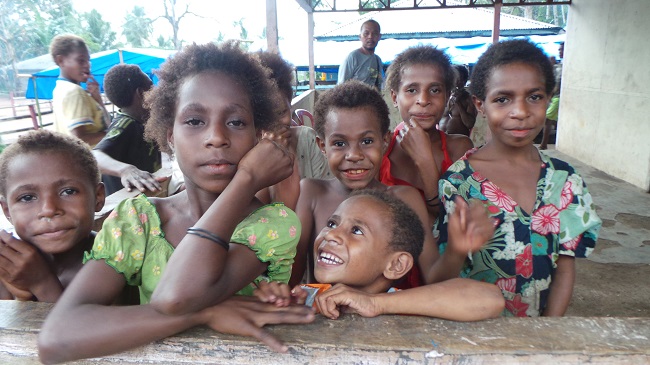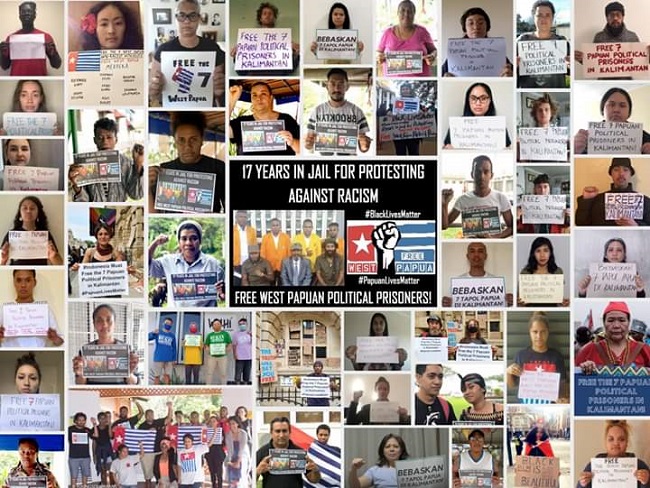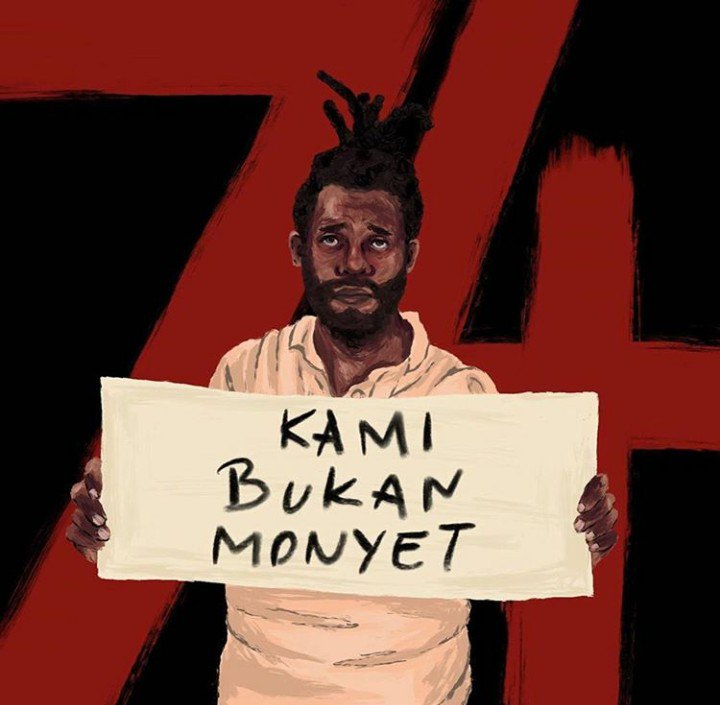A movement seeking justice, healing, and freedom for Black people has become a powerful rallying call for Indigenous West Papuans
A movement seeking justice, healing, and freedom for Black people has become a powerful rallying call for Indigenous West Papuans
Sophie Chao
The brutal murder of 46-year-old Minneapolis resident George Floyd on 25 May 2020 has triggered an unprecedented spate of protests against racism and police violence across the United States. This event has in turn prompted social uprisings denouncing systemic racial discrimination and state abuse of power in over fifty countries across the Global North and South, including Australia, the United Kingdom, and parts of Africa. In Indonesia, ‘Black Lives Matter‘ – a movement that seeks to bring justice, healing, and freedom for Black people - has become a particularly powerful rallying call for Indigenous West Papuans in the context of their ongoing experiences of marginalisation and oppression.
Just under a year ago, similar anti-racism demonstrations rippled across West Papua and the Indonesian archipelago, triggered by the physical and verbal abuse of West Papuan students by civil militia and the police in the Javanese city of Surabaya. These protests were attended by thousands of participants, both Papuan and non-Papuan, and attracted widespread attention from national and international media. In several locations, riots broke out, resulting in the destruction of several government buildings, numerous physical injuries, and over fifty casualties, of which West Papuans accounted for the majority.
Over six thousand policemen and soldiers were flown into the region to control the protests. The internet was unlawfully shut down in 54 cities and regencies across Papua and West Papua, and access to foreign nationals banned outright. Dozens of Papuan demonstrators were arrested by the police and reportedly beaten with rods or burnt with cigarettes while in custody. Many among them are awaiting trial on charges of treason and face potential prison sentences of between five and seventeen years.
Resonating with the Black Lives Matter protests in the US and elsewhere, the anti-racism demonstrations of the summer of 2019 were spurred by West Papuans’ deep-seated frustrations with the pervasive racial discrimination they have and continue to face under Indonesian rule. Rapidly, the demonstrations turned into a renewed demand for self-determination in the form of a referendum – a promise that was made to West Papuans over half a century ago yet remains unfulfilled. At the same time, the construction of ‘race’ in West Papua has followed its own distinct historical trajectory – one that long predates the region’s incorporation into Indonesia.
A history of prejudice
In the course of the nineteenth century, the term ‘Papua’ transformed into a biologised category and came to define a racially distinctive area encompassing island Southeast Asia and the western Pacific, variously named ‘Papuanesia’ or ‘Oceanic Negroland.’ While foreign explorers during this period diverged in their classification of racial variation within and across the region, all identified a distinct difference between putatively inferior ‘black’ Papuans and putatively superior ‘brown’ Malays. These early colonial racial classifications – and in particular, the epithet ‘negro’ – transposed upon New Guineans a whole range of prejudiced assumptions about inferior intelligence, productivity, and morality already associated with African peoples in European colonial thinking. The representation of Papuans as chronic and incorrigible warmongers in colonial writings only further enhanced their association with primitivism and barbarism.
After Indonesian independence in 1949, racial differences between Papuans and Malays were repurposed by the Dutch in order to deny Indonesia administrative rights to West New Guinea and to reaffirm their own control over the region. Over the course of the next twenty years and up until the controversial Act of Free Choice of 1969, Papuans were subjected to systemic acculturation in the form of Indonesianisasi (‘Indonesianisation’).

This government-endorsed process aimed to strengthen national unity by incorporating West Papuans into the Indonesian state through formal education, national media, economic development, and transmigration. To this end, Papuans had to relinquish their superstitious beliefs and embrace enlightenment and progress in the form of adherence to formal religion. They had to abandon the primitive practices of hunting and shifting cultivation in favour of intensive market gardening, eat rice rather than forest-derived foods, and wear modern clothes rather than penis-sheaths. In this process, Papuans would be gradually transformed from ignorant and backward tribes to educated and civilised members of the Indonesian nation.
Structural racism
Following West Papua’s incorporation into the Republic of Indonesia in 1969, colonial and pre-colonial representations of Papuans as primordial, bestial, and infantile ‘Stone Age‘ peoples became firmly institutionalised in the practices of successive governance structures. These representations continue to be deployed to justify the denial of West Papuans’ most fundamental rights and remain widespread among Indonesian reporters, officials, and the broader public. They undergird government policies of ‘development’ (pembangunan) that purport to salvage Papuans from their backward ways yet that also frame Papuans as inherently inept in the face of modernity, globalisation, and technology.
In structural terms, racism manifests in institutional processes and practices that prioritise non-Papuan settlers over Papuans in terms of employment and education opportunities, political positions, and financial income. The growing influx of migrants, and Papuans’ own concomitant minoritisation, are often described by Papuans as part of a systemic attempt by the Indonesian state to eliminate them through population dilution, natural resource extraction, cultural assimilation, and land dispossession.
In everyday life, too, racism is a recurring motif for many Papuans across rural and urban environments. In the Papuan district of Merauke, where I undertook long-term ethnographic fieldwork between 2013 and 2019, military forces frequently intimidated Papuan children with their batons and guns, calling them ‘monkeys’ and taunted them for their ‘dark skin and curly hair.’ Parents spoke of their children being derided by non-Papuan students for foraging in the forest ‘like animals.’ Children who missed school to participate in customary rituals, sago expeditions, and other cultural practices were often reprimanded publicly by their teachers and called stupid, naïve, lazy, and dirty.
Alongside cognitive inferiority, Papuan bodies are frequently represented as polluted, dangerous, and uncontrolled in state and popular discourse and practices. Many of my friends in Merauke, for instance, spoke of being looked down upon by Javanese settlers because of their skin colour and curly hair. Several villagers reported being refused entrance to shops and public transport because their bodies ‘smelled bad.’ The supposedly primitive mores and sexual promiscuity of Papuans are also frequently invoked by medical practitioners in explaining the prevalence of HIVAIDS in West Papua – the highest rates in the country – which conversely hampers the effectiveness of health campaigns.

Pejorative epithets directed towards West Papuans, such as pig, dog, and monkey, further entrench the conjoined logic of racialisation and animalisation at play in the framing of Papuan peoples as inferior and savage. Of particular symbolic significance here is the figure of the monkey – a species that, alongside pigs and dogs, is routinely deployed in Indonesian popular and official discourse to characterise Papuans as primitive, wild, and uncivilised.
Black Lives Matter
Against this historical backdrop, the Black Lives Matter movement matters for West Papuans because West Papuans continue to be treated, in the words of activist Filep Karma, ‘like half-animals.’ In and beyond the region, West Papuans are routinely subjected to discriminatory treatment that renders them sub-human, killable, and disposable before the law. It comes as little surprise that endemic racial oppression has become a critical denominator in the formation of Papuan’s sense of collective identity, or what Papuans call memoria passionis. Memoria passionis, or ‘passionate remembrance,’ conveys Papuans’ common history of suffering under Indonesian rule – their ongoing and systemic dispossession of lands and freedoms, their subjection to physical and psychological violence, and their as-of-yet unfulfilled demands for self-determined futures.
Addressing and overcoming every day and systemic forms of racism faced by West Papuans today will require attending to the particular historical trajectories, cultural landscapes, and ethnic differences at play in the region. It calls first and foremost for a shared recognition and understanding of what racism means and does as a concept and practice in the West Papuan context. This includes its manifestations in institutional and individual behaviours, its social and psychological consequences for Indigenous West Papuans, and its detrimental impacts on social justice, equity, and harmony.
In this struggle, West Papuans have found valuable allies among Indonesian activists in and across the archipelago who are increasingly joining voices and forces to denounce racial discrimination at the national and global levels. Indeed, raising international awareness of the relevance of Black Lives Matter in West Papua constitutes a critical step towards achieving racial equality in the region – an equality that does not seek to erase cultural or ethnic difference, but rather that finds in that difference the promise of justice across diversity.
Sophie Chao (sophie.chao@sydney.edu.au) is a postdoctoral research associate at the University of Sydney, whose research explores the intersections of Indigeneity, ecology, and capitalism in West Papua. For more information, please visit www.morethanhumanworlds.com.
Related articles from the II Archive
Hunger and culture in West Papua
Untreated trauma in Nduga
Competing Papuan identities
West Papua: Inside Indonesia?



